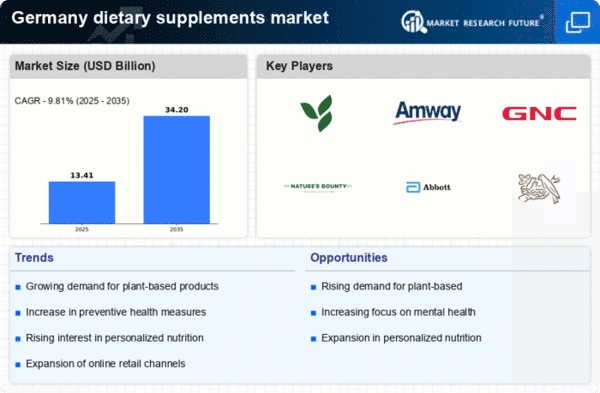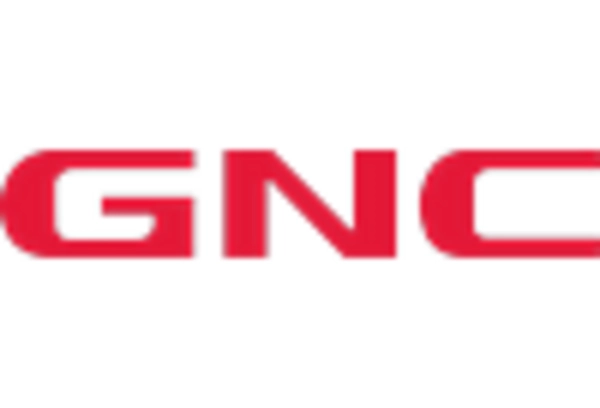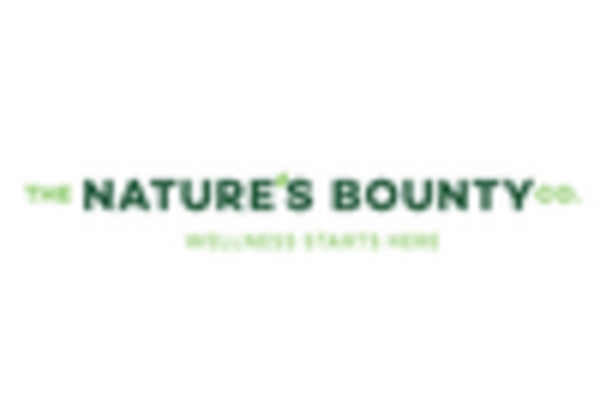Aging Population
Germany's demographic shift towards an aging population is significantly impacting the dietary supplements market. With a growing number of individuals aged 65 and older, there is an increasing demand for products that address age-related health concerns. This demographic is particularly interested in supplements that support joint health, cognitive function, and cardiovascular health. Market analysis suggests that the dietary supplements market could see a growth rate of around 10% in the coming years, driven by this aging population. Companies are responding by developing targeted formulations that cater to the specific needs of older adults, thereby expanding their product offerings within the dietary supplements market.
Rise of E-commerce Platforms
The dietary supplements market in Germany is witnessing a transformation due to the rise of e-commerce platforms. Online shopping has become increasingly popular, providing consumers with convenient access to a wide range of dietary supplements. This shift is supported by data indicating that online sales of dietary supplements have increased by over 15% in the last year alone. E-commerce allows for greater product variety and competitive pricing, which appeals to consumers seeking value. Additionally, the ability to read reviews and access detailed product information online enhances consumer confidence in purchasing dietary supplements. As a result, e-commerce is likely to play a pivotal role in shaping the future landscape of the dietary supplements market.
Focus on Preventive Healthcare
The dietary supplements market is being influenced by a growing focus on preventive healthcare among consumers in Germany. Individuals are increasingly prioritizing proactive measures to maintain their health and prevent chronic diseases. This trend is reflected in the rising sales of dietary supplements that promote wellness and disease prevention. Market data suggests that the preventive health segment within the dietary supplements market is expected to grow by approximately 12% over the next five years. Consumers are particularly interested in supplements that support heart health, digestive health, and immune function. This shift towards preventive healthcare is prompting manufacturers to innovate and develop products that align with these consumer priorities.
Increasing Health Consciousness
The dietary supplements market in Germany is experiencing a notable surge due to the increasing health consciousness among consumers. As individuals become more aware of the importance of nutrition and wellness, they are actively seeking products that can enhance their overall health. This trend is reflected in the market data, which indicates that the demand for dietary supplements has grown by approximately 8% annually over the past few years. Consumers are particularly interested in vitamins, minerals, and herbal supplements that support immune function and general well-being. This heightened awareness is driving innovation within the dietary supplements market, as companies strive to meet the evolving preferences of health-focused consumers.
Regulatory Support for Natural Products
The dietary supplements market in Germany benefits from regulatory support for natural products, which is fostering growth and innovation. The German government has established guidelines that promote the safety and efficacy of dietary supplements, encouraging consumers to choose natural options. This regulatory environment is conducive to the development of high-quality products, which is appealing to health-conscious consumers. Market analysis indicates that the demand for natural dietary supplements has increased by approximately 20% in recent years, as consumers seek alternatives to synthetic products. This trend is likely to continue, as regulatory support enhances consumer trust in the dietary supplements market, ultimately driving sales and market expansion.
















